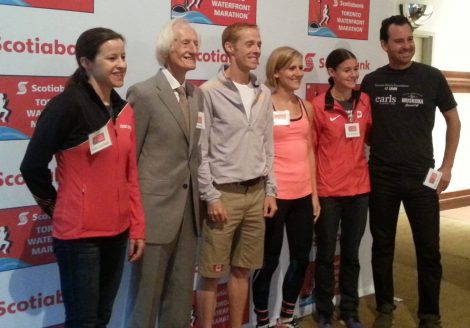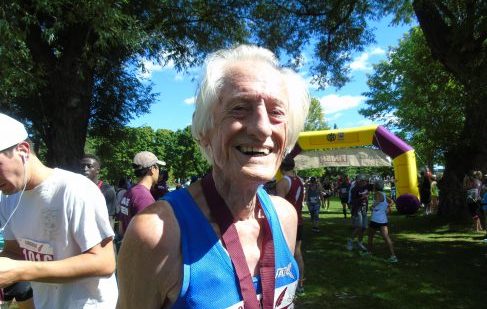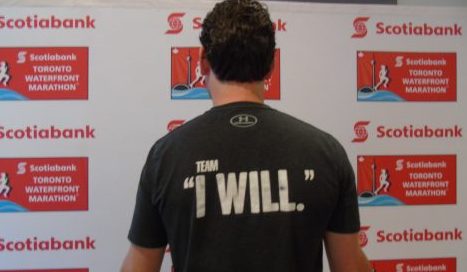
This year’s Scotiabank Toronto Waterfront Marathon (STWM) will feature the strongest field of Canadian elites in the race’s history. We had the opportunity to meet six of the talented and inspiring runners who will share the course with 26,000 other participants on October 16th.
This is the first of two stories we’ll have on the press conference introducing the Canadian elite field held at the Toronto Marriott Hotel.
The Prodigal Son

Rio still hasn’t quite sunk in for Eric Gillis, but it’s not because it was a shock. If you still haven’t heard, Gillis finished 10th in the Men’s Marathon at the Rio Olympics. The Guelph runner said outright, “I had a goal to be in the top ten…to execute on the day still hasn’t quite sunk in.”
Instead of slowing down and basking in his achievement, Eric rode the positivity and immediately shifted his focus to STWM.
Gillis admits that he’s feeling different following Rio in a very positive way, evidenced by the fact that he chose to take on another marathon so soon after the Olympics. Typically, Eric says, “After a marathon, my feeling is that I never want to do a marathon again,” a sentiment that likely felt by elite and amateur alike. Rio, however, was different, and there is a sense of excitement in Eric’s voice when he reiterates that he is going for his best performance at what will be his sixth STWM.
While he’s still a tad mum on whether or not he’s gunning for Jerome Drayton’s Canadian men’s marathon record, Eric noted in the panel discussion that he plans to run a 2:10 pace for the first half of the course, which he managed to do in 2015, and hold on to it for as long as he can. Drayton’s record stands at 2:10:08. Once he hits the finish line, Eric says perhaps he’ll have some more time to reflect on Rio as he takes some downtime, dropping to about 50 kilometres per week as opposed to the 140 he’ll typically post during peak training.
The Maverick
“We’re gonna have a good race this year, Ravi! We’re guaranteed at least one world record,” Race Director Alan Brookes said, chuckling as he gestured to Ed Whitlock. The current men’s world record for the marathon in the 85-89 age group belongs to Australian Robert Horman, who ran a 4:34 in 2004. As recently as 2013, Ed ran a 3:41 at STWM. He remains the oldest man to run a sub-3:00 marathon, having turned in a spectacular 2:54 in 2004 at the age of 73.

Ed is the most charmingly zen runner you’re likely to ever meet. Every sentence he speaks is simple, direct, and followed up with a smile. He’s also not bogged down in the details of running. Rather than working from a structured training plan that includes intervals, tempo runs, and cross-training, Ed simply sticks to the long slow distances. “It’s not what’s best for everybody and it may not even be what’s best for me,” Ed says, “but it keeps me free from the aches and pains that I’ll get with intervals.”
He admits he’s not feeling as well as he did when he ran that sub-3:00 in 2004, battling a case of frozen shoulder that limits the motion of his right arm as he runs. The day before we spoke at the conference, Ed ran what he says was his first three hour run in nearly three years, a vast difference from the lead up to his 2004 performance when he ran three hours every day during the three months prior to race day. Considering that he’s already secured the half marathon record for his age group in Kitchener earlier this year, there’s probably not too much reason to worry about Ed, who says he’ll run as long as he can.
The Fighter
Robert MacDonald (@robmac1986) made his first appearance at STWM last year when he ran the half marathon. This year, he’s going for his first full. It’s a hell of a progression for anyone, let alone someone who only a few years ago was given a 5% chance of ever being able to walk again. Robert’s accident occurred in Mexico when he tried to climb into his room instead of walking 20 minutes to pick up the key. After a three storey fall, Robert was flown to St. Michael’s Hospital, where he was treated at the Lyndhurst Centre at Toronto Rehab.

Four years later and after 400 hours with a physiotherapist, Robert is now the leader of Team I Will, a group of runners racing in support of Toronto Rehab. Last year, they raised $73,000 through their efforts. This year, Robert is hoping to raise $150,000 with 150 members of Team I Will.
For many of us, running is where we turn off our brains and turn on our body’s cruise control. For Robert, every step has to be thought through so that he doesn’t aggravate or exacerbate past injuries or cause new ones. If, for, example, Robert extends his stride too far forward, he can actually topple over. It’s an incredible feat to exercise for the length of a marathon, but Robert’s urge to support the organization that gave him a second chance keeps him motivated. He hopes, he says, to be the first in a long line of stories similar to his own.
- Ravi Singh (@ravimatsingh)





 Current Issue
Current Issue Previous Issue
Previous Issue Prior Release
Prior Release
